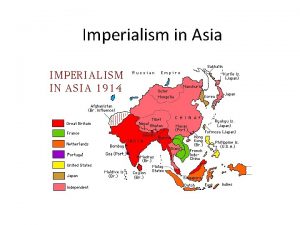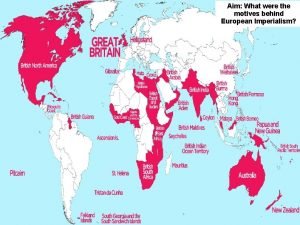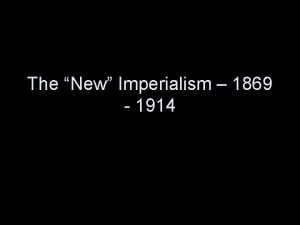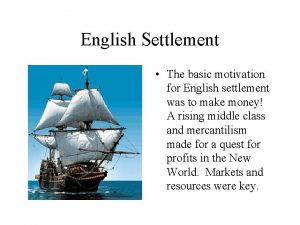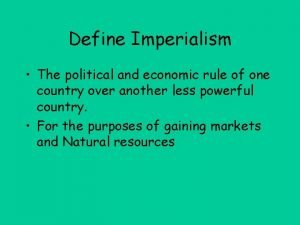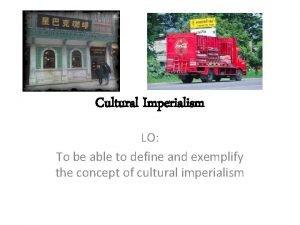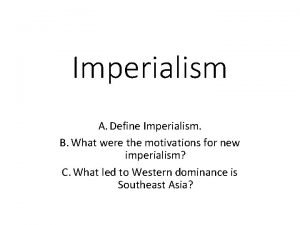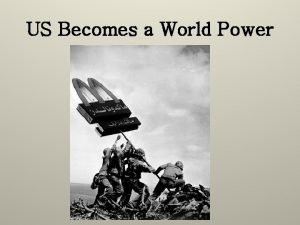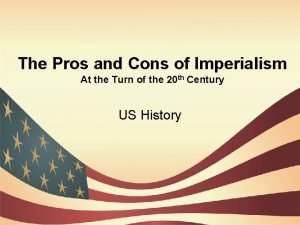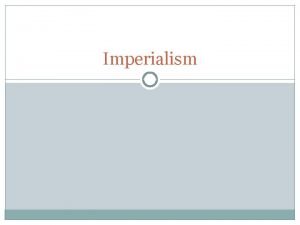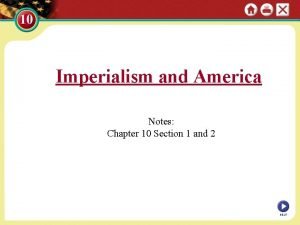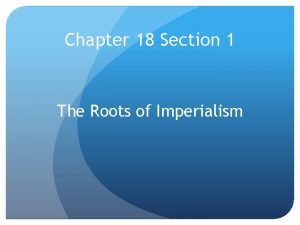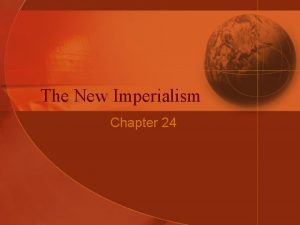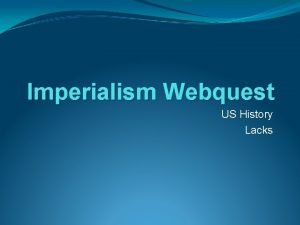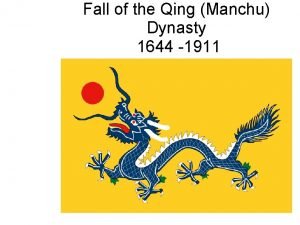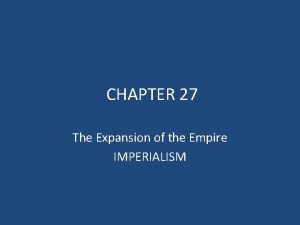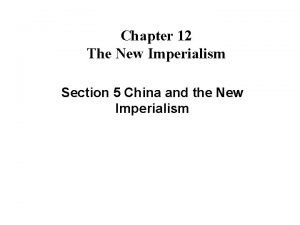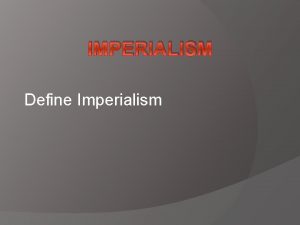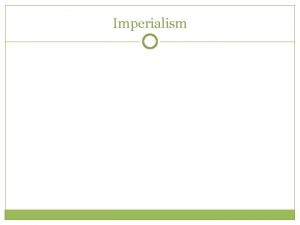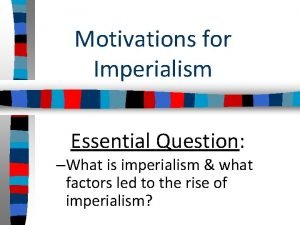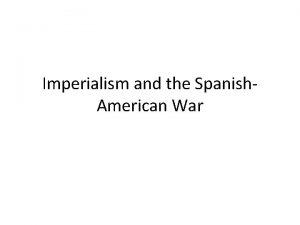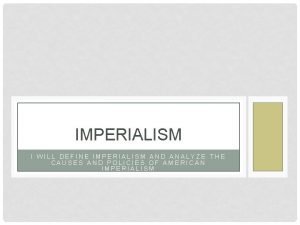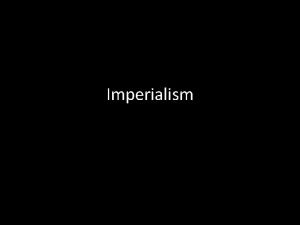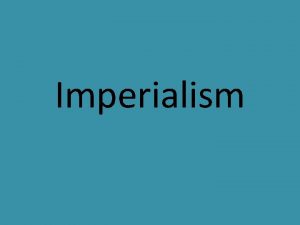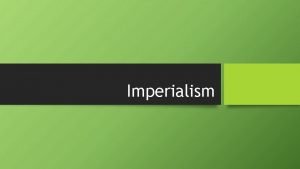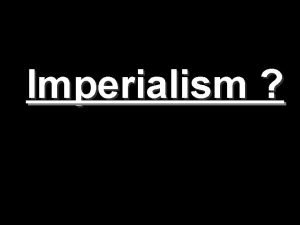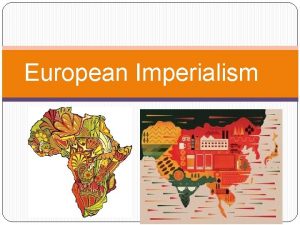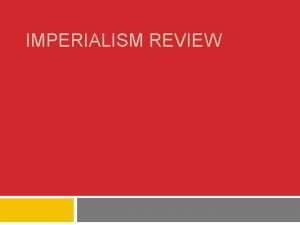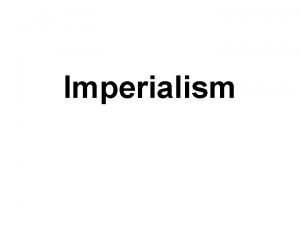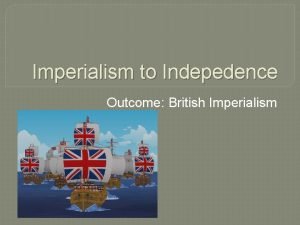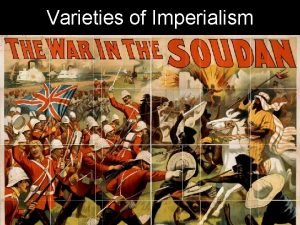1 2 Imperialism Define imperialism and the motivations



































































- Slides: 67

1. 2. Imperialism Define imperialism and the motivations behind imperialism. https: //www. youtube. com/watch? v=al. Jalt. Umr. Go 2. Examine how economic and political imperialism affected the nations and societies around the world.

What is it? - (Definition) What is it like? (Characteristics) Imperialism

Making Connections Age of Exploration Imperialism 1. Economic Motives: 2. Social/religious motives: 3. Methods of Conquest: 4. Impact of colonization: a) Positive b) Negative

Imperialism (1870 s-1910 s) 1. Definition: to dominate another country’s politics, culture, or economy v Europe had previously spread its influence during the Age of Exploration - Led mainly to trading empires v Europe used its growing industry, technology, and organization to its advantage a. Technology: telegraph, steam boats, machine guns (Maxim), railroads b. Medicines: Quinine (to treat malaria – a disease spread by mosquitoes) c. Organization – new, stronger nation-states, militarism (belief that a gov’t should maintain a strong military to promote national interests)

2. Motivations a. Economic: access to materials, a market to sell industrial goods a. Military: needed refueling stops for merchant and navy vessels, to earn prestige in the era of nationalism b. Religious goals: to Christianize & bring Westerner values to “little brothers” c. Scientific: sense of racial superiorityi. Europe had advanced technologically beyond the rest of the world ii. Europe was the fittest, the rest of the world was the weakest iii. It was the best to use the weak to continue to build up the strong

3. Types of imperial rule a. Direct rule: European nation sent their own people to govern (France) b. Indirect rule/protectorate: keep local rulers, but influence them with “advice” and by sending their kids to European schools (England, Belgium) c. Sphere of influence: an area where a European nation had exclusive trading rights, happened mostly in China

4. General process of imperialism a. Established contact and explored i. missionaries ii. explorers: Dr. David Livingston, Henry Stanley, Pierre de Brazza b. Fought for colonies with other European nations i. Each country tried to sign treaties with local tribes/kingdoms ii. Berlin Conference (1884): broke up Africa without war iii. Enforced Open Door Policy in China (1899)

Process of Imperialism c. Began to make use of the colonies, established governments i. Extracted natural resources – ivory, rubber, gold, iron, oils ii. Built improvements – Suez & Panama Canals (1869) (1914), railroads iii. Forced European values & sold cheap/old European goods d. Fought with indigenous peoples to keep control i. Zulu Uprising & Boer War: South Africans versus England ii. Maji-Maji Rebellion: Germany versus Herero in modern Tanzania iii. Sepoy Rebellion: England versus India iv. Opium War: England versus China

Imperialism 1. Compare and Contrast the two cartoons 2. How does each of these cartoons portray Imperialism? - Definition: to dominate another country’s politics, culture, or economy

Imperialism • http: //users. erols. com/mwhite 28/1907 powr. htm

Map Terms for the regions controlled by Imperialist Powers • Colony: a territory under the immediate political control of a state. • Protectorate: an independent nation that is protected diplomatically or militarily by a stronger nation. • Sphere of Influence: a region where a nation has significant cultural, economic, military or political influence. Causes of Imperialism • Nationalism • Militarism • Industrialism

Mapping Imperialism • Which region of Africa did France dominate? • The British land holdings in Africa ran (choose one) east to west / north to south from ______ to ______. • How many African colonies did Germany control? How many did Italy control?

Mapping Imperialism • How many years did it take England to gain control over India? • What were the two largest British colonies in Asia and the Pacific? • Which Europeans controlled the widest variety of resources in Asia and the Pacific?

Mapping Imperialism • Which country controlled the largest overseas empire in 1914? The second largest? The smallest? • Roughly how much (what percentage) of the world’s land came under the control of imperialist nations by 1914?

For discussion: • A. Compare the resources and land area that was controlled during this era. Did certain countries control more land or resources than the rest? • B. Fact 1: over 1 billion people live in China. Fact 2: Europe had just gone through the Industrial Revolution and waves of nationalism by 1900. Question: for what purposes did Europeans want to set up “spheres of influence” in China? • C. Fact 1: Europe/US industrialized during the 1800 s. Fact 2: The rest of the world industrialized during the 1900 -2000 s. Question: how was it that Europe/US was able to conquer the world so quickly during the Age of Imperialism?

Imperialism & Anti-Imperialism Heart of Darkness – Joseph Conrad • “They were conquerors, … They grabbed what they could get for the sake of what was to be got. It was just robbery with violence, aggravated murder on a great scale, and men going at it blind – as is very proper for those who tackle a darkness. ” The Sacred Mission of Civilization – King Leopold II (Belgium) • “Our refined society attaches to human life (and with reason) a value unknown to barbarous communities. The Belgian army have always present in their minds a strong sense of honor…not sparing their own blood, they will the more spare the blood of natives, who will see in them the all-powerful protectors of their lives and property. ”

Arguments over Imperialism pg. 752 Comparing Viewpoints Imperialist Arguments Anti-Imperialist Arguments • 1. Cecil Rhodes • 1. Chief Kabongo Where does Rudyard Kipling’s the White Man’s Burden fall in this argument?

The White Man’s Burden Take up the White man's burden – Send forth the best ye breed – Go bind your sons to exile To serve your captives' need; To wait in heavy harness On fluttered folk and wild – Your new-caught, sullen peoples, Half devil and half child. Take up the White Man's burden – No tawdry rule of kings, But toil of serf and sweeper – The tale of common things. The ports ye shall not enter, The roads ye shall not tread, Go make them with your living, And mark them with your dead! Take up the White Man's burden – In patience to abide, To veil the threat of terror And check the show of pride; By open speech and simple, An hundred times mad plain. To seek another's profit, And work another's gain. Take up the White man's burden -And reap his old reward: The blame of those ye better, The hate of those ye guard – The cry of hosts ye humour (Ah, slowly!) toward the light: -"Why brought ye us from bondage, "Our loved Egyptian night? " Take up the White Man's burden – The savage wars of peace – Fill full the mouth of Famine And bid the sickness cease; And when your goal is nearest The end for others sought, Watch Sloth and heathen Folly Bring all your hope to nought. Take up the White Man's burden – Ye dare not stoop to less – Nor call too loud on freedom To cloak your weariness; By all ye cry or whisper, By all ye leave or do, The silent, sullen peoples Shall weigh your Gods and you. Stanza 1: • Portrayal of Colonizers (Westerners): • Portrayal of colonized natives: Stanza 2 • Motivations for Imperialism: Stanza 3, 4 & 5 • Outcome of Imperialism: – What did the colonizers want to happen? – What actually happened? – What was the White Man’s “reward” for imperialism? – What does Kipling mean by the last 4 lines?

Europeans Two Views on Colonized Natives The image of a half-devil and half-child creates a dual personality for those who are colonized, and it serves to justify different aspects of imperialism. “Half-Devil” • The half-devil portrayal establishes the colonized as violent savages. Evil, trickster nature. “Half-Child” • The half-child portrayal establishes a need for a more knowledgeable colonizer to teach the innocent and ignorant colonized about life and civilization. – “(Ah, slowly!) toward the light”

The White Man’s Burden • Compare the Poem to the images • Create your own representation of the ‘White Man’s Burden’

What the United States has Fought For

Purpose of Imperialism “Models of Civilization”

Africa 1880

Division of Africa

- Explorers and missionaries increase contact in interior of Africa - King Leopold arranges trade treaties in Africa, along the Congo River - Rival claims by Britain, France, and Germany throughout the rest of the African continent - 1884 Berlin Conference = Europeans divide Africa to avoid conflict Event Partition of Africa - 1884 - Europeans establish new borders in Africa (w/out consulting Africans) - European states exploit Africans (for resources & markets) - European powers compete for colonies - Africans resist/ revolt against European rule -African leaders forge nationalist movements, attempt to create new & independent African nations

Characteristics of African Imperialism 1. 2. How does each of these cartoons portray imperialism in the African Congo? What motivations does each of these cartoons address? What do these cartoons suggest are the outcomes of imperialism in the Congo?

The Congo and South-West Africa • South-West Africa – Germany attempts to exterminate the Herero (80% killed) and Namaqua (50% killed) people by encouraging famine and poisoning wells • Congo - King Leopold II of Belgium personally owned the colony for ivory and rubber – Estimated 16 million natives died between 1885 -1908

Characteristics of Imperialism in Africa • The African Cake – introduction to the European colonization of Africa. Questions • What process did European powers use to divide up Africa? • How did Europeans justify the colonization of Africa? • What were two effects of European colonization that you observed in the video?

The Berlin Conference: The General Act of Feb. 26, 1885 1. Locate Berlin, the Congo River, and the Niger River. 2. Paraphrase each of these agreements. Pay particular attention to Chapter VI, these were the key terms. 3. Who was invited to this conference? Who was noticeably lacking an invitation? 4. Who is to have free navigation on the Niger and Congo River? Who is not provided free navigation? 5. Make an inference: what were the main goals of the Berlin Conference?

Causes of Imperialism Review • Nationalism European nations wanted to demonstrate their power and prestige to the world. – Balance of Power European nations were forced to acquire new colonies to achieve a balance with their neighbors and competitors. • Economic Motives The Industrial Revolution created an unquenchable demand for raw materials and new markets. • White Man's Burden The Europeans’ sense of superiority made them feel obligated to “civilize the heathen savages” they encountered.

Characteristics of Imperialism in Africa Sources Colonization in Africa Video Imperialism: a Sample Treaty The Berlin Conference Link to Literature: “The Gentlemen of the Jungle” Two Views of Imperialism in Africa: David Livingstone & Basil Davidson Africa’s Next big war? Characteristics of Imperialism (Actions of the Colonizers, Reactions of the Colonized) Irrational borders created (divides tribes), war & conflict

Characteristics of African Imperialism • Division of Land made by European Explorers & Leaders – Without consent of Africans – White Europeans believe they are racially superior to Africans (White Man’s Burden argument) – Borders created ethnic conflict that continues today • Violence – Competition between Europeans turns violent • Ex: Boer Wars between Dutch & English settlers in South Africa with the Zulu’s caught in the middle resisting both groups of Europeans – Africans resist European Rule • Ex: Samori Toure (Algerian leader) battles the French • Native Groups Revolt & form Nationalistic movements – Form tribal or religiously based national identities to resist Europeans • Ex: Usman dan Fordio in Nigeria sets up a Muslim state

Warm-Up • What does this cartoon suggest is the primary reason businesses and governments get involved in imperialistic ventures? – Use Specific details from the cartoons to support your answer

Expansion of British Rule in India British East India Company (founded by Queen Elizabeth I in 1700 s many British politicians had Stock in the company, but Co. Not run by the Gov’t) 1857 British Government took Control & made India a colony (Direct Rule)… How did this happen?

British Imperialism in India Causes 1. Mughal (Indian) empire lacks strong rulers 2. British East India Company increase influence by ‘divide & conquer’ tactics *exploit religious divisions & rivalries between local rulers so the BEIC is most powerful force in India 3. 1857 Sepoy Mutiny BEIC employed Indian soldiers (Sepoys) who revolted against the British 4. British Gov’t steps in to stop the Revolt Event British Government Colonial Rule in India - British viceroy (representative of British gov’t) replaces East India Company Effects 1. India used for it’s natural resources & as a market for British goods Effects: - India’s once prosperous hand-weaving industry is ruined -massive deforestation -Famines sweep India in late 1800 s 2. Changes to India by British Gov’t - Revised legal system (outlaw Sati & other native customs) - Built schools & railroads 3. Cultural Diffusion - Ex: Maharajas

Imperialism in India • Economic Motives The Industrial Revolution created an insatiable demand for raw materials and new markets. • Suez Cannel makes this possible & profitable http: //regentsprep. org/regents/global/themes/imperialism/india. cfm

Characteristics of British Rule in India • Violence in Conquest • Local ‘Rulers’ with British control • Cultural Diffusion Ho. B: 3: 00 – 7: 00 Maharaja: 0 – 5: 30

Warm up – Daily Life in India British Army Social class determined the way of life for British Army in India. Upper-class men served as officers. Lower-class British served at lesser rank and did not advance past sergeant. Only men with the rank of sergeant and above were allowed to bring their wives to India. Officer’s wives often attempted to re-create England in the home setting. Officers and enlisted men spent much of the day involved in sports, with the upper-class officers socializing at arranged events. Questions: Examine the photo and the two captions • 1. How did a person’s social class, whether British or Indian, impact their daily lives in India? 2. Make Predictions - How do you think the British viewed the Indians? 3. How do you think the Indians viewed the British? Indian Servants Caste determined Indian occupations. Jobs were strictly divided by caste. Castes were divided into 4 broad categories called varna. Indian civil servants were of the 3 rd varna, house and personal servants were 4 th varna. Even within the varna, jobs were strictly regulated. For example in the photo both servants were of the same varna but the person washing the man’s feet was of a different caste than the person using the fan.

Questions: Warm-up Discussion 1. How does each of these cartoons represent China? 2. How does each cartoon represent the British? 3. If the Middle East decided to stop selling the US oil what do you think the US’s response would be? Why? 4. How does the US try to prevent drugs from entering the country? Cartoon 1 • Translation: “I say, you must buy this poison immediately. We want you to really poison yourselves, so that we will have enough tea to comfortably digest our beefsteaks!” Cartoon 2

How was China divided into Spheres of Influence by European Interests?

Causes of the Decline of Qing China Causes Economic disruptions 1. Opium trade (controlled by the British East India Co. ) disrupts Chinese economy a. Opium War with Britain (China loses) Political disruptions 1. Treaty of Nanjing forces China to make concessions to the British gov’t a. Series of ‘unequal treaties’ / gives Westerners power Social changes 1. Population explosion 2. Widespread government corruption & tax evasion Violence Erupts 1. Taiping Rebellion (civil war kills 20 million) 1850 -64 2. Sino-Japanese War (China defeated by Japan) 1894 -95 3. Boxer Rebellion (opposing Western imperialism)1899 -1901 2 yr. old boy becomes emperor – Qing Dynasty falls Event Decline of Qing China Western powers create Spheres of Influence in China

Tasks • Revolts, Rebellions and Unrest • Tasks: • Read the notes and the sections in the textbook that address these events. • Fill in the Chart: Imperialism – Keeping Power, Putting down Rebellions • Answer the questions on your assignment sheet in the space provided. • Discuss your findings with the class.

Revolts, Rebellions and Unrest The Boer War Causes British Actions British Justifications Indigenous Reaction(s) Victor Outcome(s) The Opium War Trade China and Brit, boats attacked China, The Sepoy Rebellion

Imperialism – Keeping Power, Putting down Rebellions After you have finished the Chart choose one of the conflicts to summarize by creating a first person account of the event, (either in a letter, political cartoon, journal entry, etc. ) 1. Choose one viewpoint to Represent (either British or Indigenous) 2. Include the causes, British actions, and the outcome in your summary • Viewpoints to choose from: • Imagine you were a British politician. Defended the actions of the British Empire towards one of these groups of people. Defend your statement with facts. OR • Imagine you were a Chinese, Boer, or an Indian during the era of imperialism. Explain how you would have felt towards the British. Defend your statement with facts.

Revolts, Rebellions and Unrest The Boer War The Opium War The Sepoy Rebellion Causes Boers fled to Africa for religious freedoms, British want natural resources in S. Africa (diamonds & gold) British was selling opium to China British take control of India 1600 -1850 and sepoys do not like British authority British Actions Started reconquering Boer states Continued trade and forced unequal treaties on China British took best jobs and make sepoys servants (rifle cartridges) British Justifications British Found both diamonds and gold in S. Africa. British claim on the land is stronger British think they are superior to China - Better weapons and more $ British think they are superior to the Indians. Making them civilized (Sati) Indigenous Reaction(s) Started fighting the British with guerilla tactics China Outlaws opium Rebelled but not trade enough troops Victor Outcome(s) England wins and annexed South Africa England win and annexed Hong Kong Britain won, monarch ruled through a viceroy

Muslim regions • Ottomans and others in decline by 1700’s • Reform movement tighten Islamic religion ex: Muhammad Ahmad- He was the savior or the Mahdi • Ottomans- Greece, Balkans and other gained independence, attempted to Westernize which eased and created tensions in empire • Sultans rejected western reforms • Young Turks-overthrew sultan 1908, but WWI broke out in 1914 • Genocide- Armenians( Christian) Muslim Turks accused them of supporting Russian takeovers, up to 1 million murdered or die from disease.

Egypt and other • Struggle over Suez Canal • 1800’s reforms mad by Muhammad Ali • Tax collection, irrigation projects and production western military training • Imperial competition after his death: French hired a business to make canal • https: //www. youtube. com/watch? v=Ml. M 1 G 3 oa. UZo • https: //www. youtube. com/watch? v=L 0 J-VIv. KLsc • 1881 British made Egypt a protectorate • Note that Britain and Russia competed over Persia for goods and oil, forced gov to grant concessions

Conflicts over Modernization in Japan • Allegory of the New fighting the Old in early Meiji Japan, circa 1870


The Meiji Restoration – time period in Japanese history in which Japanese leaders sought to modernize Japan and adopt Western ways. • • Analysis of Statistics from the Meiji Restoration Question: After examining the statistics below, how is Japan changing between 1870 and 1914? With industrialization came the demand for coal. There was dramatic rise in production, as shown in the table below. Coal production Year Coal production (metric tons) • Coal was needed for two things: steamships and railroads. The growth of these sectors is shown below. Year Coal Production 1875 600, 000 1885 1, 200, 000 1895 5, 000 1904 797 1905 13, 000 1913 1514 1913 21, 300, 000 Year # of Steamships 1873 26 1894 169 Year Track (miles) 1872 18 1883 240 1887 640 1894 2100 1904 4700 1914 7100

Japan’s response to Western Imperialism Rise of a New Empire Causes - Social and Economic unrest - Foreign pressure Meiji Restoration - Strong Central Government Effects - Builds an empire by - Extend influence in Korea

Japan’s response to Western Imperialism Causes/ background -Feudal system at firs, very set class divisions, emperor, shoguns, daimyo, peasants - Social and economic unrest -Foreign pressure western powers (US/ Mathew Perry) try to force open Japan - Daimyo and samurai revolt over modern changes Rise of a New Empire Meiji Restoration - Strong central government - Businesses adopt Western methods - Leaders encourage industrialization - Social changes and Industrialism lead to nation building (similar to western motives) Effects - Builds an empire by… - Extends influence in Korea how? - Conflicts with Chinaresults? - Defeats Russia in War

Effects of Imperialism Effects 1. Europe added to their empires (1/5 th of the land area & much wealth 2. Cultural Diffusion 3. Growth of global markets/ commercial revolution – Disappearance of small farms to enable mass production 4. Rivalries = tension, wars later Long-Term Effects 1. Tense relationship with the west today – 2. Economic exploitation, racist ideas Lack of modernization =severely underdeveloped nations – Many old colonies are still 3 rd world or developing nations 3. Borders- ethnic or cultural lines leading to conflicts – – Terror regimes (Congo) led to mass killings, torture and amputations Pakistan and India-


Effects of Imperialism Effects 1. Europe added to their empires (nearly 1/5 th of the land area of the globe) and to their wealth 2. Cultural Diffusion of western culture/ political ideas 3. Growth of global markets/ commercial revolution – Disappearance of small farms to enable mass production 4. Rivalries over European empires leads to increasing tension between European powers - eventually erupts into war… Long-Term Effects 1. Legacy of imperialism – many colonized nations resent western influence creating tense relationship with the west today – 2. Economic exploitation, racist ideas Lack of modernization in many colonized nations led to severely underdeveloped nations – Many old colonies are still 3 rd world or developing nations 3. Borders do not reflect ethnic or cultural lines leading to conflicts – – Terror regimes (Congo) led to mass killings, torture and amputations Pakistan and India

Current Change Africa Developing World Powers • Conflicts over land, resources and political power common in Africa • EX: Sudan – due to the continuous fighting in Sudan (1950 s – today) the country has decided to split. • India and China – A referendum took place in Southern Sudan in January 2011, in which 98% of S. Sudan voted to split. – New State will be formed on July 9 th 2011 – Changes in Sudan: http: //www. guardian. co. uk/world/video/2011/jan/05 /sudan-independence-referendum – Two most populous countries in the world – Both are developing economies (India 10 th largest world GDP, China 2 nd largest world GDP and fastest growing economy)

Where are they today…

Japanese Contact with Foreign Powers Japanese View of Americans/ Westerners Outcome: American/ Western View of the Japanese

Imperialism - to dominate another country’s politics, culture, or economy Causes Building Imperial Empires • Africa • India • China Effects

Review: Causes of European Imperialism Economic Causes Political and Military Causes New Imperialism Social Causes Technological causes

Review: Causes of European Imperialism Economic Causes Political and Military Causes -Need for natural resources - Desire to expand markets - Outlet needed for growing populations (Industrial Revolution) - Bases needed - Nationalism (pride and prestige of a global empire) - National Security New Imperialism Social Causes - Desire to Spread Christianity/ Western Civilization - Belief in racial superiority - Belief in Social Darwinism Technological causes - Advances in communication - Medical Knowledge - Advances in weaponry/ overseas travel (makes conquest possible)

Review Chart India Type(s) of Imperialism: - Direct Control Indirect Control Spheres of Influence Africa Direct and Indirect control List the European/ Western countries that laid claim to these areas (Use the map to help you fill in the boxes) GB, Germany, GB France, Portugal, Belgium, Spain, Italy… European and Western Motives/ Perspectives on Imperialism Resources (diamonds, gold) Trade (new markets) westernizing Revolts, Boer war Native Perspectives on Imperialistic Expansion China Spheres of Influence GB, French, Germany, Japan spices (Indian Resources (silk, goods), religion, tea, china) nationalism, trade, racial superiority Revolt (Sepoy opium war Rebellion

timeline • TEST this TH! • Ch 22 - readings, power points, Germany Italy, Balkkans • Ch 24 - All sections but sec 3, Imperialism • Ch 25. 1 summary- quick overview of Japan, • Russian revolution: slides and fill in.

Japan Lesson • http: //aboutjapansociety. org/content. cfm/const ructing_imperial_japan *5/6 3: 33 – 8: 00 *6/6 0 – 8: 18 • Japanese History of Edo period to Maiji Restoration • 5/6 - http: //www. youtube. com/watch? v=a. PMZ 4 su. RSj. Y • 6/6 http: //www. youtube. com/watch? v=4 v. Hvm. AVSy. UI&fe ature=BFp&list=WL 8 EFC 9 C 7 C 6 E 02 B 8 D 7&index=1

Sources • http: //www. japanfocus. org/-Erin-Murphy/3182 • http: //www. coedu. usf. edu/main/departments/s eced/webq/social%20 studies/history/jberringer/ default. htm • What US has fought for http: //www. mentorhigh. com/roberts/APUS/APU SHP 8/APUSLecture 8 B. html • http: //www. npr. org/2004/04/26/1851882/mand ela-an-audio-history

Sources 2 • Lesson Plan http: //jimburns. net/jimpages/portfolio/lp. asp – Orwell’s ‘shooting an elephant’ http: //www. georwell. org/Shooting_an_Elephant/0. html – The Magnificent African Cake 1: 09 – 10: 44 http: //www. youtube. com/watch? v=Py 762 -u. Yvy 4 – Heart of darkness - http: //www. shmoop. com/heart-of -darkness/race-quotes. html – Modern historical interpretation of imperialism http: //vodpod. com/watch/2311248 -rachelmaddowthe-white-mans-burden

Colonialism in Africa video – 1 – 3: 24 • http: //www. coedu. usf. edu/main/department s/seced/webq/social%20 studies/history/jberri nger/default. htm American View of the World: http: //www. alamo. edu/pac/faculty/rhines/im ages/civilizationmap. jpg
 European imperialism in asia
European imperialism in asia Motivations for imperialism in asia
Motivations for imperialism in asia Motives for imperialism
Motives for imperialism Character traits and motivations
Character traits and motivations “god, glory, gold”
“god, glory, gold” God gold
God gold Old imperialism vs new imperialism
Old imperialism vs new imperialism Buying motivations
Buying motivations Yang dimaksud dengan motivasi interpersonal adalah
Yang dimaksud dengan motivasi interpersonal adalah What did samuel de champlain accomplish
What did samuel de champlain accomplish John cabot motivations
John cabot motivations English motivations for settlement
English motivations for settlement Old imperialism motives
Old imperialism motives Define imperialism
Define imperialism Cultural imperialism def
Cultural imperialism def Define imperialize
Define imperialize Hình ảnh bộ gõ cơ thể búng tay
Hình ảnh bộ gõ cơ thể búng tay Bổ thể
Bổ thể Tỉ lệ cơ thể trẻ em
Tỉ lệ cơ thể trẻ em Gấu đi như thế nào
Gấu đi như thế nào Thang điểm glasgow
Thang điểm glasgow Hát lên người ơi alleluia
Hát lên người ơi alleluia Môn thể thao bắt đầu bằng từ đua
Môn thể thao bắt đầu bằng từ đua Thế nào là hệ số cao nhất
Thế nào là hệ số cao nhất Các châu lục và đại dương trên thế giới
Các châu lục và đại dương trên thế giới Công thức tiính động năng
Công thức tiính động năng Trời xanh đây là của chúng ta thể thơ
Trời xanh đây là của chúng ta thể thơ Mật thư tọa độ 5x5
Mật thư tọa độ 5x5 Làm thế nào để 102-1=99
Làm thế nào để 102-1=99 Phản ứng thế ankan
Phản ứng thế ankan Các châu lục và đại dương trên thế giới
Các châu lục và đại dương trên thế giới Thơ thất ngôn tứ tuyệt đường luật
Thơ thất ngôn tứ tuyệt đường luật Quá trình desamine hóa có thể tạo ra
Quá trình desamine hóa có thể tạo ra Một số thể thơ truyền thống
Một số thể thơ truyền thống Cái miệng xinh xinh thế chỉ nói điều hay thôi
Cái miệng xinh xinh thế chỉ nói điều hay thôi Vẽ hình chiếu vuông góc của vật thể sau
Vẽ hình chiếu vuông góc của vật thể sau Nguyên nhân của sự mỏi cơ sinh 8
Nguyên nhân của sự mỏi cơ sinh 8 đặc điểm cơ thể của người tối cổ
đặc điểm cơ thể của người tối cổ Ví dụ về giọng cùng tên
Ví dụ về giọng cùng tên Vẽ hình chiếu đứng bằng cạnh của vật thể
Vẽ hình chiếu đứng bằng cạnh của vật thể Vẽ hình chiếu vuông góc của vật thể sau
Vẽ hình chiếu vuông góc của vật thể sau Thẻ vin
Thẻ vin đại từ thay thế
đại từ thay thế điện thế nghỉ
điện thế nghỉ Tư thế ngồi viết
Tư thế ngồi viết Diễn thế sinh thái là
Diễn thế sinh thái là Dot
Dot Các số nguyên tố là gì
Các số nguyên tố là gì Tư thế ngồi viết
Tư thế ngồi viết Lời thề hippocrates
Lời thề hippocrates Thiếu nhi thế giới liên hoan
Thiếu nhi thế giới liên hoan ưu thế lai là gì
ưu thế lai là gì Sự nuôi và dạy con của hổ
Sự nuôi và dạy con của hổ Khi nào hổ con có thể sống độc lập
Khi nào hổ con có thể sống độc lập Hệ hô hấp
Hệ hô hấp Từ ngữ thể hiện lòng nhân hậu
Từ ngữ thể hiện lòng nhân hậu Thế nào là mạng điện lắp đặt kiểu nổi
Thế nào là mạng điện lắp đặt kiểu nổi What's the difference between colonialism and imperialism
What's the difference between colonialism and imperialism American imperialism pros and cons
American imperialism pros and cons Opium wars defintion
Opium wars defintion Chapter 10 section 1 imperialism and america
Chapter 10 section 1 imperialism and america Chapter 18 section 1 imperialism and america
Chapter 18 section 1 imperialism and america Chapter 24 section 5 china and the new imperialism
Chapter 24 section 5 china and the new imperialism Imperialism in india webquest
Imperialism in india webquest Queue hair
Queue hair China and imperialism
China and imperialism Chapter 12 section 5 china and the new imperialism
Chapter 12 section 5 china and the new imperialism
